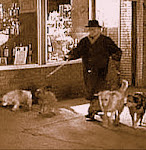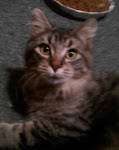As I sat down to write this post, my mind wandered a bit and reminded me of a completely unrelated episode that seems to fit hand and glove with what I intended to write. A few weeks back I was in Chicago for my 30th High School Class Reunion. I expanded the weekend into a full week so that I could visit with friends I haven't seen in quite awhile.
A few weeks prior I contacted Carolyn with whom I've been friends for about twenty-three years. As it happened, one of the days I suggested we spend together was Rosh Hashana, so she nixed it up front. I thought about it, and in light of my recent reading and in recognition of the many years of our friendship, I suggested that I attend services with her if she didn't mind.
She pointed out that it wouldn't be like a regular Friday night service. I asked how it would be different and she indicated it would be longer and with more singing. Sounded good to me. I explained how our Easter Vigil service can go on for hours.
I was struck by the similarities more than the differences. This being one of the "big days" - like Christmas and Easter for Christian churches - they have to plan for three to four times the regular attendance. The members who had planned the service were watching to see that people were in the right places at the right time. Key readings from the Torah were shared. All in all I can say I enjoyed myself.
I must admit that I thought about the Holocaust. I looked around me at the hugh space filled with American Jews and wondered about their families, thought how in a different place and time they would be targeted for who they were. I sat there, quite possibly the lone goy, and thought about being the outsider. Much of the service was in Hebrew and the folks around me knew enought to at least be able to sing along regardless of whether or not they understood the exact meaning of the words. Later at the brunch afterwards one of Carolyn's friends explained, "It's just like for you when the church used Latin." I chose not to point out to her that in recent times only the Roman Church had used Latin in there service, but being raised Roman Catholic I figured she was close enough and I understood the point she was making.
The folks that had gathered for brunch were all members of this congregation. It was like sitting in on a Coffee Hour conversation where the movers and the shakers are gathered. They began to discuss ways in which to engage these extra folks who show up for the High Holy Days, get them to come around more often the rest of the year. They began joking about having special material for when both of the spouses were actually Jewish..."No, not to worry, your Jewish-Jewish marriage is welcome here...we're not all mixed marriages." Apparently they have a significant number of couples in which one of the couple is not Jewish. Perhaps then I was far from being the only Christian in the service earlier.
The other episode from my past that came to mind involved a day I spent on the far South Side of Chicago. I was working with this woman who had never ventured as far north in the city as she had to come to work at Children's Memorial Hospital in Lincoln Park. She had planned a barbecue at her house and I agreed to come on down. In fact, I agreed to come down early and help her get ready.
I took the train down from the Loop. She met me at the station and we ran some errands. The entire time I was the only caucasian. For the first time in my life I experienced how it felt to be the other, the outsider. It was an important experience that I have not forgotten.
I pause before typing this next bit...I feel the need to explain that it was a perfectly normal experience. I did not feel threatened. The folks around me were not hostile. Yet the very fact that I feel the need to explain this belies the subtle racism that permeates the dominant culture. Perhaps you think I'm being overly sensititve or overly politically correct.
When my mother was working on her PsyD she took a class on racial issues and psychotherapy. The course was taught by this awesome woman, Samella Abdullah. Early on in the quarter she announced a practical assignment. Each student was to go to a community event where they would be the outsider. They would then be expected to write about their experience.
My mother ended up talking to me about this assignment. I said, "Yeah? So what? She's not telling you to go to a Housing Project at midnight on a Saturday. Go to a church service or something."
What we didn't realize then was that she expected the students to bring news of this assignment back to their friends and families. In the days that followed, she questioned the students to see who had done this and every last one of them had. She then asked about the responses they got from their friends and families. My mother was the only student in the class who reported that her family member wasn't shocked and thought it was no big deal. All the rest had horrified friends and family - "How can she make you do that? How can she put you in danger like that?"
And so I pause as I acknowledge my need to explain that I was treated just like everyone else that day I visited the South Side. As if you wouldn't assume that that was exactly how things would be. I'm not sure how much of that is my own latent racism that I struggle with or an assumption of the same on the part of some of my readers.
Samella also once said that she would take an outspoken, bigoted conservative any day over a typical white liberal. She felt that at least with the one she knew where she stood fromt he get go, whereas the liberal truly believes that he is not racist, unaware of all the subtle racism that permeates.
Wanting desperately to not be racist, understanding the evil of racism, doesn't cleanse us of it completely.

















